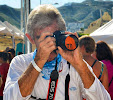
VICTOR BARREDA, A well-respected ship’s agent in Cabo San Lucas for 35 years
Victor Barreda, with his warm smile, impeccable English and eagerness to help was a welcome surprise for the travel-weary yacht owners arriving in Cabo San Lucas over the past 35 years and needing to negotiate through the labyrinth of officialdom in Baja. An innovator, Victor saw a need and found a solution. This characteristic served him well throughout his life as he applied it to his business, community and family.
Victor was born in the rural village of Arispe, Sonora. He competed among 100 primary-school children for an educational scholarship to the United States, and won. His prize was to travel to Tucson and study English upon graduation. After studying in Tuscon, he went on to the University of San Francisco where he received his degree in business.
Returning to Sonora to a job with a major copper company, he married Patricia Lozano Nuňez. In 1972, they moved to Cabo San Lucas where he and Pati taught English. They supplemented their income by selling Pati’s beaded jewelry and homemade cheeses on the beach.
Seeing a need by the arriving yacht owners for help with their Mexican paperwork, they started a ship’s agency business in 1973. During the past thirty-five years, the Barredas’ agency, “Sea Preme”, has specialized in helping visiting sportfishers, powerboaters and sailing skippers alike wade through the documents required by the Mexican authorities.
To understand the immense impact Victor had on the early development of Cabo San Lucas , you have to look back to what he found when he first arrived from Cananea, Sonora. Cabo was little more than a small, remote village nestled on the San Lucas Bay. The incredible fishing a few miles offshore was the attraction to the adventuresome yacht owners whose vessels were large enough to make the journey down the rugged Baja West Coast from California, and even beyond.
It is hard for today’s visitor to even imagine what Cabo didn’t have then. No fancy marina---only the cement quay wall adjoining the soccer field in the inner harbor and only a few hotels and restaurants. If a yacht planned to stay for an extended period, everything from mooring tackle to provisions had to be brought down on the boat. Fuel could only be purchased at the cannery at the entrance to the inner harbor.
“Victor was always there for you for whatever you needed. One day when I was fueling at the old pier getting ready to return to San Diego, Mexican Fish and Game came on board and freaked out over the tank full of cabillitos we had loaded for the trip. In desperation I called Victor on the VHF, and within minutes he arrived. It was the first time I had ever heard Victor speak in a harsh tone to anyone. Needless to say the Mexican Fish and Game got off the boat in a hurry. Victor will be missed”… Bruce Kessler, Yacht Zopilote.
“Victor Barreda was always bailing out us gringos who had come up against the brick walls of Mexican bureaucracy.”… Pat & John Rains, San Diego.
“Back in the late 70’s, finding water and fuel was tough. Victor came up with the idea of hiring a tank truck to deliver fuel and water to the boats at the quay wall. Problem solved. When there was a problem, Victor found a solution. Without Victor, Cabo San Lucas will never be the same”…Captain Peter Groesbeck.
In a community where huge developments and projects were commonplace, Victor demonstrated that innovation came in many shapes. He made “special service” his mantra and applied it to his entire life allowing him to make an extraordinary contribution to the community he chose to call his home.
Victor Barreda, 61, succumbed to a long illness on January 24, 2008. A memorial service to celebrate his life was held February 16th aboard the vessel Tropicat. Victor will be remembered for his integrity and his tireless effort to find solutions to the challenges the thousands of yacht owners and tourists encountered over the years.
According to his wife, Victor always wanted his ashes to be scattered in Bahia San Lucas because he dearly loved the bay and the boaters that it attracted.
Pati Barreda, along with their son, Victor Barreda, Jr. and his wife, Alejandra, will continue to operate Sea Preme, the agency that Victor and Pati created back in 1973.
The Sea Preme Agency office is located at the foot of the Pedregal, just south of downtown Cabo San Lucas. They can be reached at (624) 143-0207 or office cell phone (624) 147-5019 or by email, agebarr@prodigy.net.mx.
My email address is roadtrekker1@verizon.net .

